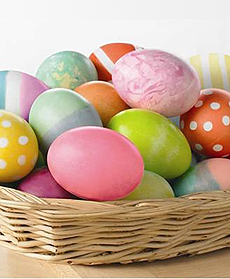April 15, 2011 at 7:58 am
· Filed under Easter, Kosher Nibbles, Passover, Tip Of The Day
|
Here are some egg safety tips from the USDA, for everyone planning an Easter egg hunt or cooking eggs for the Passover seder.
Hard-cooked eggs for Easter and Passover celebrations should be prepared with care.
EASTER EGG TIPS
If you plan to eat the Easter eggs you decorate, be sure to use only food grade dye—not paint or fabric dye.
Consider making two sets of eggs: one for decorating and hiding, another for decorating and eating (see the tip in the photo caption). Or, you can use plastic eggs for hiding.
For an Easter egg hunt, throw away any cooked eggs with cracked shells. Bacteria can enter and contaminate the egg inside.
Keep hard-cooked eggs chilled in the fridge until just before the hunt.
Hide eggs in places that are protected from dirt, pets and other bacteria sources.
|
|

As pretty as they look, hard-cooked eggs can
only be out of the refrigerator for two hours
at a time. If you want to decorate eggs for display, use uncooked eggs. With a needle,
punch a tiny hole in each end and blow out the contents before decorating. Photo courtesy McCormick.com. |
|
The total time for hiding and hunting eggs should be no more than two hours. Then, if the eggs are not eaten, they need to go back into the fridge. Eggs found after two hours need to be thrown out.
PASSOVER EGG TIPS
A hard-cooked egg that has been at room temperature for more than two hours should not be eaten.
The hard-cooked eggs meant to be eaten should be kept in the fridge until ready to serve.
GENERAL TIPS
When eggs are hard-cooked, the protective coating on the shell is washed away, leaving open pores where harmful bacteria can enter. Be sure to refrigerate eggs within two hours of cooking and use them within a week.
Check your refrigerator temperature with an appliance thermometer and adjust the refrigerator temperature to 40°F or below.
How to boil eggs.
|
Please follow and like us:
Permalink
Comments are closed.


